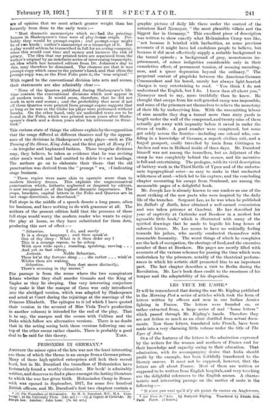PRISONERS IN GERMANY.* AMONGST the minor epics of the late
war not the least interesting are those of which the theme is an escape from a German prison. Many of these high-spirited enterprises still lack their sacred bird, but in Mr. Durnford the tunnellers of Holzminden have fortunately found a worthy chronicler. His book' is admirably written, and deserves to find a place amongst the lasting literature to which the war has given birth. Holzminden Camp in Bruns- wick was opened in September, 1917, for some five hundred British officers, and Mr. Durnford's first two chapters contain a
• (1) The Tunnellers of Harminden. By R. G. Bamford, 3f.C., ILA. Cam bridge at the University Press. [14s. net.[--(2) A Captive at Careers& ' By Joseph Lee. Landon : John Lane. 17s. 6a. net.] graphic picture of daily life there under the control of the notorious Karl Niemeyer, " the most plausible villain and the biggest liar in Germany." This excellent piece of description was written to show exactly what Holzminden Camp was like, " not because it bristled with barbarities, as some previous accounts of it might have led credulous people to believe, but because it did most effectively supply a suitable background to the tunnel episode ; a background of grey, monotonous im- prisonment, of minor indignities considerable only in their cumulative effect, of permanent tension, of seeming unending- ness, and a queer depression beyond the ordinary." The perpetual contest of pinpricks between the American-German Commandant and his bored, unruly but always light-hearted charges is very entertaining to read. " You think I do not understand the English, but I do. I know dam all about you," Niemeyer used to say, more truthfully than he knew. He thought that escape from his well-guarded camp was impossible, and some of the prisoners set themselves to relieve the monotony of their life by undeceiving him. With the unremitting labour of nine months they dug a tunnel more than sixty yards in length under the wall of the compound, and twenty-nine of them actually got away with impunity before it caved in under the stress of traffic. A good number were recaptured, but some got safely across the frontier—including one colonel who, con- fiding in a knowledge of German, a superb civilian suit, and a forged passport, coolly travelled by train from Gottingen to Aachen and was in Holland inside of three days. Mr. Durnford himself was not among the tunnellers, but as Adjutant of the camp he was completely behind the scenes, and his narrative is full and entertaining. The prologue, with its vivid description of battery work in the Third Battle of Ypres and of the unfortu- nate topographical error—so easy to make in that uncharted wilderness of mud—which led to his capture, and the concluding chapter recounting his escape from Stralsund, are among the memorable pages of a delightful book.
Mr. Joseph Lee is already known to our readers as one of the most striking of the new poets who were inspired by the daily life of the trenches. Sergeant Lee, as he was when he published his Ballads of Battle, later obtained a well-earned commission and was taken prisoner at Cambrai. He has described his year of captivity at Carlsruhe and Beeskow in a modest but agreeable little book,' which is illustrated with many of the spirited drawings that he made to beguile his long hours of enforced leisure. Mr. Lee seems to have no unkindly feeling towards his jailers, who mostly conducted themselves with reasonable humanity. The worst things of which he complains are the lack of occupation, the shortage of food, and the excessive number of fleas at Beeskow. His pages are mostly filled with accounts of the various schemes for passing the time which were undertaken by the prisoners, notably of the theatrical perform- ances in which his artistic skill promoted him to an important part. The last chapter describes a visit to Berlin during the Revolution. Mr. Lee's book does credit to the sweetness of his temper and the adaptability of his disposition.


































 Previous page
Previous page